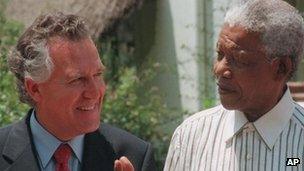Nelson Mandela praised Wales' anti-apartheid 'inspiration'
- Published
Friend of Nelson Mandela Peter Hain said his legacy was a peaceful nation
Former South African President Nelson Mandela, who has died aged 95, had praised Wales' contribution to the anti-apartheid fight during his only visit to the country.
Mr Mandela's visit in 1998 came four years after he swept to power in South Africa's first democratic elections.
He met the Queen at Cardiff Castle and was granted the freedom of the city.
Mr Mandela called Wales' anti-apartheid measures "a great inspiration to us in our struggle".
Members of the public applied in their thousands for tickets to see Mr Mandela at the freedom ceremony, which was held to coincide with a meeting of the EU heads of government in Cardiff in June 1998.
Speaking at the ceremony, the then Welsh Secretary Ron Davies said: "The name Nelson Mandela carries the ultimate message, that good can triumph over evil."
In return, Mr Mandela paid tribute to those he felt had helped in the fight against apartheid.

Anti-apartheid campaigner and Neath MP Peter Hain meeting Nelson Mandela in Johannesburg in 2000
"When the call for the international isolation of apartheid went out to the world, the people of Wales responded magnificently," he said.
"The knowledge that local authorities all over Wales were banning apartheid products from canteens and schools - and that the universities, the Welsh Rugby Union, and the choirs had cut their links - was a great inspiration to us in our struggle.
"So too was the contribution organised by Welsh workers. Action on such a scale could only flow from strong support by ordinary Welsh people on the ground.
"So we knew that the Wales Anti-Apartheid Movement spoke for a people who cared for our freedom as their own."
Among the guests was South African exile Hanif Bhamjee, secretary of Action for Southern Africa, formerly the Wales Anti-Apartheid Movement, and an acquaintance of Mr Mandela from the age of 15.
He said at the time: "Nelson Mandela has a special place in the hearts of Welsh people. The anti-apartheid campaign was always very strong here, possibly stronger than in any other part of Britain."
Mr Bhamjee was later awarded an OBE for race relations in recognition of his life-long fight against apartheid.
'A nation more at peace'
Also attending was Adelaine Hain, mother of Neath MP and former Welsh Secretary Peter Hain, who was present at Mr Mandela's trial in the 1960s where he was charged with attempting to overthrow the government.
Mrs Hain, who had to leave South Africa with her family after she and her husband were placed under banning orders, said she had never thought at the time that the day would come when Mr Mandela would visit Cardiff.
Her son Peter called Mr Mandela a lifelong figure of inspiration, adding: "It's difficult to imagine what South Africa would be without him, because he's been so central to the whole transformation from the evil of apartheid into a new rainbow nation which we saw so joyously at the [2010 football] World Cup which celebrated this non-racial harmony.
"Yes, it has problems, but Mandela's legacy was to build a nation more at peace with itself than ever in its torn history."
Opposition to apartheid was not shared by all in Wales. In 1986, a Welsh male choir known as the Jones Choir travelled to South Africa to perform in defiance of widespread opposition to dealings with the country at the time.
A representative of the choir said they had travelled there to extend the hand of friendship.
Three years later, 10 Welsh rugby players and six officials joined a World XV tour to celebrate the centenary of the South African Rugby Board (SARB), which was widely condemned both at home and in South Africa.
The WRU set up an inquiry into the players' involvement, and was heavily critical of both the methods used to recruit players by the SARB and of the players who took part despite a WRU ban on links with South Africa.
- Published6 December 2013
- Published6 December 2013
- Published6 December 2013
- Published8 June 2013